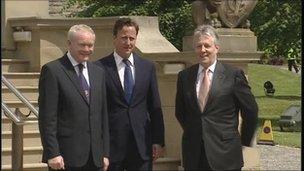Rise in NI's peace walls 'disappointing' says Cameron
- Published
David Cameron congratulates Stormont members for "extraordinary courage and commitment"
The increase in the number of peace walls in NI is disappointing, the Prime Minister David Cameron has said.
He told the NI Assembly that since the 2006 St Andrews Agreement, the number of peace walls had risen from 37 to 48.
"It is disappointing that in too many places, Protestant and Catholic communities remain largely segregated, he said.
He cited a survey that suggests duplicating services because of segregation costs £1.5bn a year.
"Northern Ireland needs a genuinely shared future; not a shared out future," he said.
He added NI politics needed to move on to more 'bread and butter' issues.
"Politics needs to move beyond the constitutional issues to the issues of work, safe streets, a stable home life and family," he said.
"Politics is about public service on behalf of the whole community."
Mr Cameron is on a one-day visit to Northern Ireland. He was met at Stormont Castle by the first and deputy first ministers.
He is the second prime minister to deliver a speech to members in the debating chamber since the Good Friday Agreement was signed.

David Cameron was greeted by Peter Robinson and Martin McGuinness
In his speech, he described the Queen's recent visit to Ireland as an "extraordinarily huge act of reconciliation".
On the Saville Inquiry's findings on Bloody Sunday in Londonderry in 1972, he described it as: "one the sorriest episodes in our country's history".
The Prime Minister said progress in NI would not have happened without the courage and conviction of people from all the political parties in the Assembly.
"Our task is to move Northern Ireland even further forward," he said.
Security, job opportunities and a shared future for the people of Northern Ireland were discussed at a meeting earlier on Thursday with the first and deputy first ministers.
After leaving the Stormont estate on Thursday afternoon, Mr Cameron met local Tories in east Belfast and went to another engagement in Fermanagh.